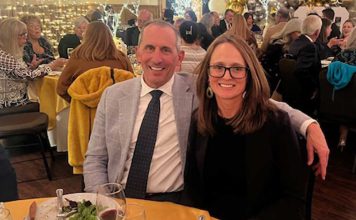Marie Blankley said if she was elected mayor of Gilroy, her priorities would remain the same as they are in her current role as councilmember: financial stability, public safety, streets and sidewalks, and building relationships with county and state representatives.
Such a focus is what a public official needs if they want to be effective in their role, she said.
“You can’t be all things to everything,” Blankley said. “You have to focus on certain things. If you spread yourself too thin, you won’t be able to do a very good job.”
Blankley was first appointed to the Gilroy City Council to fill an open seat in 2018, and later that year was elected to a four-year term. She served as mayor pro tempore in 2019.
She previously served on the city’s planning commission from 1992-99, as well as the Chamber of Commerce board and other community organizations.
Blankley, a Certified Public Accountant, opened her practice in Gilroy in 1996.
Gilroy needs to start over on its finances with a zero-based budget, Blankley said, where all departments’ revenues and expenditures are analyzed with a fresh outlook, rather than building off of previous years’ worth of budgets. The Covid-19 pandemic, which has slashed Gilroy’s revenues and forced staff layoffs, could be the trigger for such a budgeting process, she added.
Blankley said she will continue to work with the council to promote economic recovery and job creation. The city can streamline its permitting processes to make it easier for businesses to set up shop here, she said.
In recent years, the city’s planning process has been a source of frustration for business owners, according to Blankley, such as receiving inconsistent answers or not getting all the facts up front. She said things have been much improved with the hiring of a new community development director in December and other changes.
“What the city can do is continue to keep making the process smooth,” she said. “We do not need to cause the hurdles that people face.”
Gilroyans, Blankley added, can aid in the efforts by supporting local businesses and stop “trash talking” the downtown.
“If you keep discouraging people from coming downtown and checking things out, how are we going to get businesses to be there?” she said. “Businesses want to be there if they find a way to make money. They need to see people waiting to eat at the restaurants downtown.”
Public safety, another of Blankley’s priorities, is an “essential city service that everyone deserves and should expect,” she said.
In late 2019, the council allocated funding toward the proposed Glen Loma Fire Station in west Gilroy, yet that funding was later pulled in order to pay for city services due to budget cuts brought on by Covid-19.
Blankley said she wants to bring that funding back as soon as possible. She also expressed frustration over the Glen Loma Ranch development agreement, which states the station must be completed before Glen Loma applies for a permit for its 1,100th residential unit.
“I have exhausted having our city attorney looking at it and making sure there is nothing we as a city council can do to force something to be done now,” Blankley said.
For police, Blankley said she will continue to address the review of policies such as use of force and hiring. She added that she sees “no reason to believe our police department is overfunded” when asked about local and nationwide protests over police funding.
Blankley serves on the Valley Transportation Authority Board, which oversees road and other transportation projects throughout the county.
“When I was elected in 2018, no one from Gilroy was representing us on the VTA Board,” she said. “A seat at the table anytime there’s taxpayer money to be divvied is critical to ensure that Gilroy receives our proportionate share of funding.”
Blankley supported the council’s recent decision to evaluate the condition of sidewalks city-wide, which she said will provide “a complete and unbiased blueprint and can take advantage of cost savings that result from a contractor being hired to repair multiple sidewalks at the same time.”
Having a relationship with county and state representatives is crucial for Gilroy, she said, especially when it comes to new legislation such as the Senate Bill 330 housing requirements and other efforts to deal with homelessness.
“To call this a challenge is an understatement, but meeting regularly with our representatives gives a necessary heads-up to legislation that affects us and the opportunity for me to make sure Gilroy’s voice is always heard,” Blankley said.















